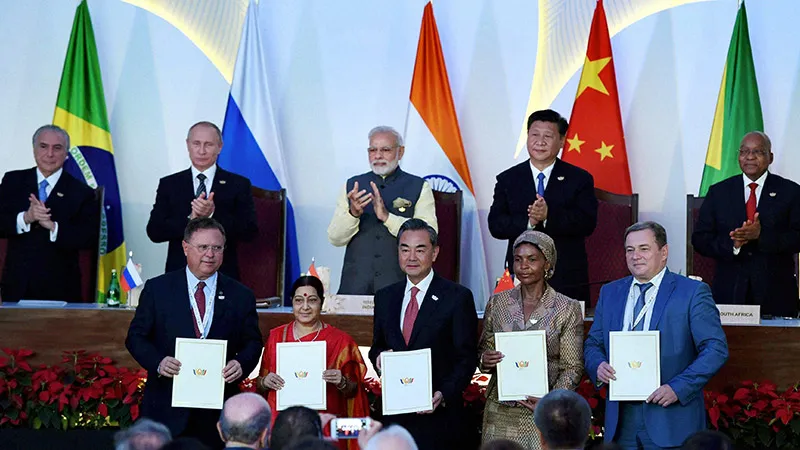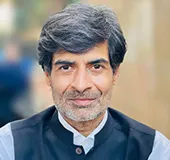Heading into the BRICS summit in Goa last weekend, Indian diplomacy sought four key objectives. First, use the forum to strengthen bilateral relationships with all four countries, especially Russia and China. BRICS as a grouping will undoubtedly be served well, and its mandate strengthened, as a result of political exchanges at the bilateral level. Second, stabilise the BRICS regime at a time when some of its major constituents have been perceived as disruptive forces in the international order. Third, leverage the platform to highlight concerns of cross-border terrorism emanating from Pakistan, and lend momentum to India’s efforts to promote a comprehensive, multilateral instrument to tackle terrorism. And fourth, consolidate and build on the institutionalisation of intra-BRICS initiatives, aimed mainly at promoting economic growth.
All four objectives were materially advanced by New Delhi at the summit, with varying degrees of success. At a time of general turbulence in the international system, whether it is armed conflict in Syria, contestation in the South China Sea or the imminent overhaul of global climate and trading regimes, India can take credit that the summit concluded on a sober, even footing, without letting the political predilections of each power holding sway over the group.
On the subject of terrorism, the Goa declaration strongly endorsed multi-national efforts to tackle the spread of terror networks, and specifically urged countries to crack down on terrorist organisations designated by the United Nations Security Council. It is frankly besides the point that groups based in Pakistan. such as Lashkar-e-Taiba and Jaish-e-Mohammed did not find mention by name in the declaration, since they are groups that are listed by the UNSC under its anti-terror sanctions regime. The references to terrorism in Afghanistan in particular are significant, as they cast a shadow over Islamabad’s conduct in preventing its neighbour from pursuing its “independent political and economic course”. India’s pointed references to Pakistan’s less-than-constructive role in tackling home grown terror networks indicate New Delhi is prepared to sustain its recent efforts to draw ever more global attention to the subject.
The conversations on terrorism in Goa, however, should not detract from the substantial progress that BRICS countries have made in the last year in charting a common economic narrative. Thrown into sharp relief by Britain’s exit from the European Union, the diminishing appetite for integrated markets and indeed, globalisation as we know it, has not deterred BRICS countries from pushing ahead with key economic initiatives.
The Goa declaration correctly highlights the critical role of the New Development Bank (NDB) in attracting foreign investment and supporting renewable energy and infrastructure projects in the global South. Consensus on a BRICS credit rating mechanism was not forthcoming at the 8th summit, given that a consolidated view on perception of financial risk and regulation is a sensitive matter. It is worth noting here that the NDB itself was the product of many such BRICS meetings, both at the level of leaders and sector experts. The credit ratings mechanism is an important initiative that should be pursued with vigour when BRICS finance ministers, industry associations and independent experts now meet over the course of the calendar year to flesh out its details.
Among the biggest takeaways from the summit’s deliberations is BRICS’ continued willingness to take on the unfavourable economic headwinds together, whether by pushing towards greater integration of its markets, facilitating the mutual ease of doing business or providing accessible capital to its businesses. India’s hosting of the BRICS and BIMSTEC summits helped in highlighting that trade ties need to be significantly enhanced, not just among BRICS, but also between BRICS and BIMSTEC countries. On this count, the declaration’s heightened attention and call to build the capacity of micro, small and medium enterprises to ensure they are included in global value chains are significant as they are crucial sources of employment.
The summit declaration also brought the focus back to international norms that promote stability and inclusion in common spaces. At a time when mega-regional trading agreements have significantly altered the discourse on cross-border trade, the summit stressed the need for co-operation in crucial matters relating to Intellectual Property Rights and the digital economy. BRICS members have always attributed a position of “centrality” to the WTO-led trading system, but their endorsement this year is significant.
The Goa declaration reflects an important moment in the group’s history, which has seen the “alternative” powers weighing on the side of liberal, multilateral trading institutions that were conceived by the West. References to the “open and non-fragmented” nature of digital spaces should not be viewed from the prism of Internet governance alone. It is also a pointed reference to the need to keep cyberspace open for commerce, and prevent its “stratification” by exclusive trading regimes.
The BRICS summit in Goa reinforces India’s position as a “bridge” between the liberal institutional order and the potential disruptive impulses of major powers that have opened up the possibility for contestation. Its concurrent hosting of the < style="text-decoration: underline;">BIMSTEC heads of state meeting allowed New Delhi to raise the grouping’s profile, and signal its importance to India’s neighbourhood diplomacy in the days to come.
As for the Goa declaration, India may not have had its way on every issue – this is only natural, just as New Delhi sought to moderate the influence of Moscow’s holding the pen at the BRICS Ufa summit last year, the gives and takes of diplomacy ensure a document that is acceptable to all. The Goa declaration ensured the BRICS ship continues to sail steady, and remains on course for bigger and more effective projects in the years to come.
This commentary originally appeared in Hindustan Times.
The views expressed above belong to the author(s). ORF research and analyses now available on Telegram! Click here to access our curated content — blogs, longforms and interviews.




 PREV
PREV


